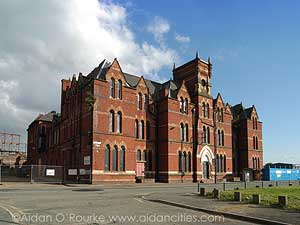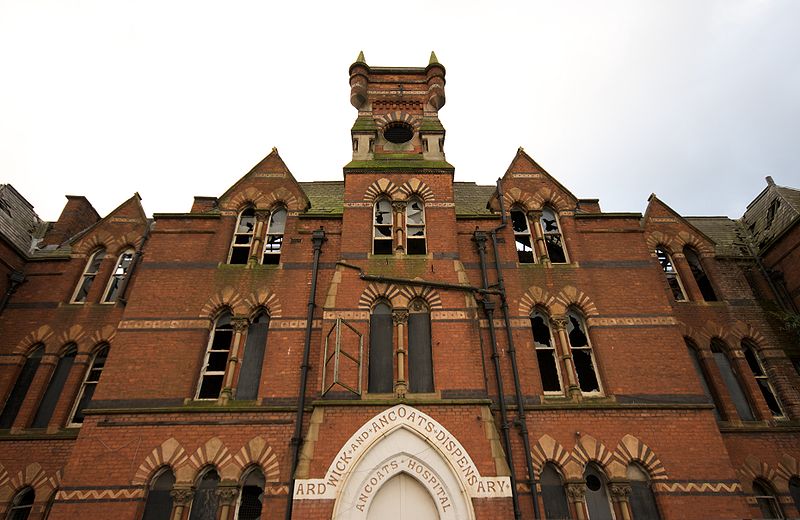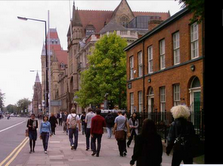The Manchester Homeopathic Hospital and Dispensary
November 29, 2009
 The Manchester Homeopathic
Dispensary
at** **Great Ancoats Street
Manchester,
The Manchester Homeopathic
Dispensary
at** **Great Ancoats Street
Manchester,
Patrons: Robert Barnes, Francis Egerton 1st Earl of Ellesmere, Mayor of Manchester, Sir J Potter, Thomas Egerton 2nd Earl of Wilton,
Management Committee: Joseph Adshead, William Armitage, James Brydon, Henry Dixon, Richard Durnford, Rev. J Gwyther, Nicholas Heald, W F Hoyland, W H Rickards, Walter R Johnson, G Robinson, Josiah Roberts, Rev. C F Smith, James Sigismund Stern, James Thompson, Henry Waterhouse, Edwin Waters,
House Stewards: James Brydon, Henry Dixon, Edwin Waters,
Physicians and Surgeons: Charles Harrison Blackley, J MacDowall, John Edward Norton, Charles D F Phillips, Edward Phillips, Alfred Crosby Pope, Charles Caulfield Tuckey, Robert Walker,
Dispensary Physicians: J MacDowall,
Matron: Mrs. Hackette,
Supporters: Richard Durnford, Joseph Heron, John Potter, James Thompson,
Treasurer: Adolf Salis Schwabe,
1842 - Ardwick and Ancoats Dispensary established as a charity, (?1841) In a guide book of 1857, quoting from the Cotton Metropolis in Chambers’ Repository, is the following: ‘The oldest and the worst working district of Manchester is the region known as Ancoats…’
1846 - the Ardwick and Ancoats Dispensary, average cost of each patient was 4s 2d,
1849 - The Manchester Homeopathic Hospital opens,
1849 - total patients seen at the hospital = 14,875,
1851 - the British Homeopathic Congress met at the Hospital,
1852 - the hospital is the only such institution in Manchester which is self supporting financially, the hospital has to put up its weekly charges from 2/6d to 5 shillings a week for in patients, 4580 payments had been received (the rest were admitted for free), and records attendances at 30,000 per annum in its second year. Subscriptions and donations have almost covered the hospital’s expenses. The hospital mortality was 6%, the number of beds available was 35 beds, prescriptions issued 45,970, number of patients admitted was 186 (8 died) (6 incurable), the dispensary has seen 28,502 patients since it opened in 1841,
1852 - the hospital is trying to fund a better premises with adequate ventilation and accommodation,
1852 - Alfred Crosby Pope reports some cases from the Manchester Homeopathic Hospital,
1852 - Mrs. Hackette was Matron of the hospital,
1853 - The British Homeopathic Congress is held at the hospital,
1854 - George Stevenson Knowles Physician at the hospital
**The **Manchester and Salford Homeopathic Dispensary
Instituted 1854 at 21 Dale Street, Lever Street
Physicians: William Philip Harrison, MacDowall, Charles Thompson, Robert Walker,
1850 - Ardwicks and Ancoates Dispensary moved to 270 Great Ancoats Street from 181 Great Ancoats Street,
1855 - John Matthews was House Surgeon at the hospital,
1855 - the Manchester and Salford Dispensary return reports 500 people seen from its inception till July 1855,
1857 - the Manchester Homeopathic Medico Chirurgical Society was founded,
1862 - The Homeopathic Observer, edited and published by the staff of the Manchester and Salford Homeopathic Dispensary,
1862 - the Manchester Homeopathic and General Medico Chirugical Society hosted by Alfred Crosby Pope is held at the hospital,
1866 - John Mason Galloway Medical Officer at the hospital,
1868 - the Manchester Homeopathic Hospital and Dispensary was now at Bloom Street, Piccadilly,
1869 - John B Morehouse was a Medical Officer at the hospital,
The Hospital staff now included:
Chairman and Treasurer: S J Stern,
Honorary Secretary: John Duffield,
Management Committee: R B Brierley, Colonel Hamilton, Joseph Heron, Robert Longdon, F Midwood, James Rigby, James Syddall, Councillor J Thompson, Councillor Waterhouse, Alderman Willert,
Medical Officers: Charles Harrison Blackley, *William Harris Cox, J Drummond, Francis Blake Hutchinson, T Lowther Mathews, T Rayner,
Surgeon: C R Fleury,
Medical Officers: W Boyle Coughlan, Moir, George C Phipps, Robert Rogerson,
The Manchester (Ancoats) Homeopathic Dispensary was at Carrowther Street,
Medical Officer: S S Macmillan,
1873 - Charles Harrison Blackley approves the new designs for the hospital (John James Drysdale, Robert Ellis Dudgeon, John Rutherford Russell, Richard Hughes (Eds.), The British Journal of Homoeopathy, Volume 31, (Maclachlan, Stewart, & Company, 1873). Page 736 onwards) (see the plans for the new Liverpool Homeopathic Hospital built in 1887).
1873 - 
 Ardwicks and
Ancoates Hospital built, (photo copyright Aidan
O’Rourke).
Ardwicks and
Ancoates Hospital built, (photo copyright Aidan
O’Rourke).
1875 - the British Congress of Homeopathy is held at the hospital,
1883 - the Manchester Homeopathic Hospital’s Bloom Street building was closed,
1908 - Enriqueta Augustina Rylands left £1000 to the hospital in her will,
1913 - Neil McDonald Medical Officer at Ardwicks and Ancoates H0spital, (see Manor House Hospital page 100)
1914 - Harry Platt Honorary Surgeon at Ardwicks and Ancoates H0spital,
1929 - Laurence Stephen
Lowry

 [painted Great Ancoats
Street,** and the hospital several
times](http://www.btinternet.com/~anthony.seaton/lowrytable.html),
**
[painted Great Ancoats
Street,** and the hospital several
times](http://www.btinternet.com/~anthony.seaton/lowrytable.html),
**
1948 - Ardwicks and Ancoates Hospital reportedly closed? but is still functioning (?was this the end of the homeopathic involvement with the building?) (the hospital was a ‘voluntary’ hospital prior to 1948)
1974 - the Ardwick and Ancoats Hospital building is Grade II, listed 3 Oct 1974,
2009 -  The
Manchester Homeopathic Clinic, Manchester M13 9ST, 0161 273
2446?
The
Manchester Homeopathic Clinic, Manchester M13 9ST, 0161 273
2446?
The People involved with the Manchester Homeopathic Hospital and Dispensary
William Armitage **1800? – 1879? **
was a British Cotton Magnate, the brother of ** **Elkanah Armitage{::}, **and the uncle of **Benjamin Armitage. In 1851, William Armitage was on the Mangement Committee of the Manchester Homeopathic Hospital, and he was a member of the Association for the Protection of Homeopathic Students and Practitioners, and his brother Elkanah Armitage was a Sponsor of the Manchester Homeopathic Hospital,
Charles Harrison Blackley 1820 - 1900
MD Brussels 1874, MRCS Eng. 1858 was a Scottish allopathic physician who suffered very badly with asthma and hay fever. He was a Physician at the Manchester Homeopathic Hospital, Charles Harrison Blackley was the first person to identify pollens as the cause of hay fever, and the first person to fully describe and study allergens. He was so impressed by the infinitesimal quantity of allergens required to cause hay fever, that in 1842, he became a homeopath and he became a member the British Homeopathic Society, Charles Darwin was very interested in the work of homeopath Charles Harrison Blackley whose work on allergy, Darwin described as ‘ingenious and profoundly interesting’.
*William Harris Cox ?1804 - 1875,
MRSC England 1856, was a British orthodox physician who converted to homeopathy to become Honorary Medical Officer at the Manchester Homeopathic Hospital and Dispensary. William Harris Cox’s Obituary is in the British Homeopathic Review, Volume 19 in 1875,
Henry Dixon **1800 - 1879? **
was a British Banker and auditor who worked at the Bank of England who was an advocate of homeopathy, and an auditor of the Mangement Committee of the Manchester Homeopathic Hospital, and a member of the Association for the Protection of Homeopathic Students and Practitioners.
Richard Durnford 1802 - 1895
was a British Vicar, Rector of Middleton (from 1835 - 1870) at St. Leonard’s Church, and then Bishop of Chester until his death. In 1851, Richard Durnford was was on the Mangement Committee of the Manchester Homeopathic Hospital, Richard Durnford spoke at length about the need for a homeopathic Hospital in Manchester, and he praised homeopaths for their ardent study of great medical texts, alongside the works of Samuel Hahnemann. Richard Durnford also praised the homeopaths for their fortitude against the coldness and emnity of the allopaths, and the sacrifices they had made to uphold their Truth, thus is was the duty of people who uphold such Truth to step forward to support them, and he was a member of the Association for the Protection of Homeopathic Students and Practitioners.
Francis Egerton 1st Earl of Ellesmere 1800 – 1857, known as Lord Francis Leveson Gower until 1833, was a British politician, writer, traveller and patron of the arts, Lord of the Treasury, Chief Secretary for Ireland, Secretary at War, President of the Royal Geographical Society and as President of the Royal Asiatic Society, and Trustee of the National Gallery, Ellesmere was an advocate of homeopathy, his family were patients of homeopaths Richard and Robert Verity, and he was a Patron of the Manchester Homeopathic Dispensary,
John Mason Galloway **1826? - 1892? **
MD Edinburgh 1852, was a British orthodox physician who converted to homeopathy to become House Surgeon at the Manchester Homeopathic Hospital, Surgeon at the Birmingham Homeopathic Hospital, Medical Officer at the Wigan Homeopathic Dispensary, a member of the Northern Homeopathic Medical Association, Secretary to the Homeopathic Congress, Honorary Secretary to the Manchester Homeopathic Medico Chirurgical Society,
William Philip Harrison **1821? - 1892? **
MRSC, LAC, was a British orthodox physician who converted to homeopathy, to become a supporter of the Manchester Homeopathic Hospital, a Physician at the Manchester and Salford Homeopathic Dispensary, and a member of the Association for the Protection of Homeopathic Students and Practitioners.
**Walter R Johnson 1821?
- 1893? **
MD London 1847, was a British orthodox physician, Gold Medalist in Medicine and Materia Media, and Medical Tutor at Guy’s Hospital, who converted to homeopathy, to become the Editor of the _Journal of Health _(replacing Ralph Barnes Grindrod), a member of the Management Committee of the Manchester Homeopathic Hospital, and a Chairman of the Manchester Branch of the Association for the Protection of Homeopathic Students and Practitioners, In 1856, Walter R Johnson practiced at Rhoda Villa, St. John’s Wood, at the Great Malvern Hydrotherapy Establishment at Malvernbury, and at the Hydrotherapy Establishment at Umberslade Hall. He then set up a hydrotherapy establishment at Wheeley Road, Edgebaston, with his father and brother, and he incorporated homeopathy into his practice. In 1872, he was practicing at again at Great Malvern, Walter R Johnson was a partner of James Manby Gully, and James Loftus Marsden,
George Stevenson Knowles **1820? - 1861 **
LRCGP Belfast, MD Edinburgh 1851, the second son of James Sheridan Knowles, and the brother of Richard Brinsley Knowles, was a British orthodox physician who converted to homeopathy, Physician at the Birmingham Homeopathic Hospital, Physician at the Manchester Homeopathic Hospital, Physician at The Belfast Homeopathic Dispensary,
T Lowther Mathews
John Edward Norton **1820?
- 1874 **
MD was a British orthodox physician who converted to homeopathy, to become a Physician at the Manchester Homeopathic Hospital, medical superintendent of the Llandudno Hydropathic Establishment, and a member of the Association for the Protection of Homeopathic Students and Practitioners,
**Alfred Crosby Pope 1830 – 1908 **
MD St. Andrews 1847, MRCSE England, was an orthodox physician who converted to homeopathy, and he was a Physician at the Manchester Homeopathic Hospital, a member Royal College of Surgeons of England, the General Secretary and Treasurer of the Northern Homeopathic Medical Association, and a Fellow of the British Homeopathic Society. Alfred Crosby Pope was awarded a MD from the Homeopathic Medical College of Pennsylvania in 1852, and he was a Lecturer in Materia Medica at the London School of Homeopathy (later merged with the London Homeopathic Hospital), and he was President Elect of the British Homeopathic Congress in 1876 and in 1877, and a staunch defender of homeopathy for over forty years. H Pope Jnr was a Physician at the Manchester Homeopathic Hospital in 1851.
Adolf Salis Schwabe **1800 – 1853 **
was a German Jew who converted to Unitarianism, a calico printer and philanthropist, born in Berlin and an immigrant to Manchester, he was a Patron of the Manchester Homeopathic Hospital and Dispensary in 1851, Chairman of the Manchester School of Free Traders, Adolf Salis Schwabe was married Julie Salis Schwabe 1819 - 1897, who founded a number of elementary schools in Naples, and she also managed the Garibaldi Schools for orphans in Naples and Turin, no doubt she discovered homeopathy there, as Cosmo Maria De Horatiis’s famous scientific trials into homeopathy caused such a storm. Adolf Salis Schwabe and his wife also lived in Paris, so it is possible they also knew Samuel Hahnemann.
**Charles Thompson 1833? - 1896 **
MRCS was a British orthodox physician who converted to homeopathy to become House Surgeon at Manchester Homeopathic Hospital, and a member of the British Homeopathic Society,
**Charles Caulfield Tuckey 1819 – 1895 **
father of Charles Lloyd Tuckey Licentiate in Midwifery 1839, LRCS Dublin 1840, AB MB Dublin 1841, Physician to Castletown Roche Dispensary, Surgeon at the Manchester Homeopathic Hospital, member of the Dublin Medico Chirurgical Society, member of The Northern Homeopathic Medical Association and Physician at the Preston Homeopathic Dispensary.
Henry Turner ?1807 - 1873
MD, was a British orthodox physician who converted to homeopathy to become a homeopathic chemist and the founder of Henry Turner & Co in 1842, a major publisher of homeopathic literature, and wholesale Agents of homeopathic supplies, Henry Turner was an activist in the cause and promotion of homeopathy in Britain and in America, Henry Turner & Co had offices in London and Manchester, and they published The British Journal of Homeopathy, The Monthly Homeopathic Review, The Homeopathic Medical Directory of Great Britain and Ireland, with John James Drysdale and George Atkin, The North American Journal of Homeopathy (British edition), and many other homeopathic books and writings from both sides of the Atlantic and from Europe.
Thomas Egerton 2nd Earl of Wilton 1799 – 1882
born Thomas Grosvenor, was a British nobleman and Tory politician, and the brother of Robert Grosvenor 1st Baron Ebury, and Richard Grosvenor Earl Grosvenor 2nd Marquess of Westminster. Thomas Egerton 2nd Earl of Wilton was a patient of Henry Kelsall, as were his two children, and he was also a patient of Paul Francois Curie, as was his children’s governess. In 1840, Thomas Egerton 2nd Earl of Wilton was the President of the London Homeopathic Medical Institution at 17 Hanover Square, and he was also a Patron of the Liverpool Homeopathic Dispensary, the Manchester Homeopathic Hospital, and the Hahnemann Hospital at 39 Bloomsbury Square. Thomas Egerton 2nd Earl of Wilton was a sponsor and President of the London Homeopathic Hospital, and his wife the Countess of Wilton Mary Margaret Stanley Egerton was an active fund raiser for the hospital, Thomas Egerton 2nd Earl of Wilton signed the petition in support of Alfred Crosby Pope, and he also defended Paul Francois Curie,